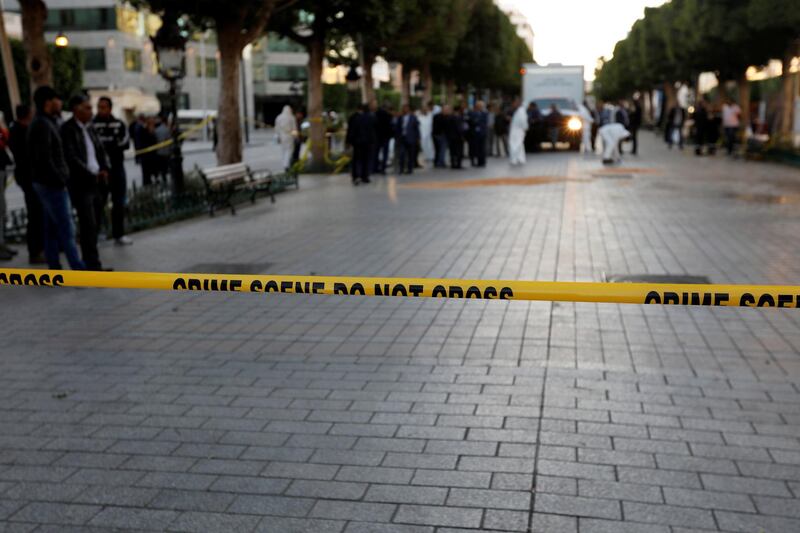Tunis is still coming to terms with the suicide bomber who detonated her charge on Avenue Habib Borguiba within in the city's busy town centre shortly before 2pm yesterday afternoon. Though casualties were limited, and the attack remains unclaimed, its repercussions stand to be far reaching.
The bomber, a 30-year-old woman from the tiny settlement of Sidi Alouane, in the coastal governorate of Mahdia, came to the capital where eyewitnesses claim to have seen her mingling with demonstrators in the city centre protesting over the shooting of 19-year-old Aymen Othmani by customs officers the previous week.
It now appears that, following the demonstration, she made her way over to one of the many police patrols within the heavily militarised area, which also houses the country’s Ministry of Interior, where she detonated her charge, killing herself and wounding 20 people, 15 of which were said to be security officers.
Mohammed Iqbel Ben Rejeb, by coincidence the President of the Rescue Association for Tunisians Trapped Abroad, an organisation charged with liaising between the families of Tunisian foreign fighters and the government, was working nearby. "I thought in the first place that it was a tear gas bomb.... but then I told myself that the sound had been too loud," he told The National.
After leaving his shop, just several yards from the site of the explosion, Mr Iqbel was able to see the full scene. “I saw that there were people who had run away in panic, and I heard a person talking about a terrorist attack, so I went to the spot to see.” However, despite the limited time frame, security services had already begun to respond to the incident. “The police then started to gradually surround the location, before closing Avenue Habib Bourguiba and it became a place like the desert,” he said.
Though much is now known about the bomber, an unemployed graduate with an English degree who occasionally worked as a shepherdess, her motivation for travelling to the capital and detonating her charge remains a mystery. "From the information we have now, the attack seems perpetrated by a lone individual with weak, if any, links to a militant group," Ludovico Carlino, a senior analyst for the Middle East and North Africa with IHS Markit, told The National. "No one has yet claimed the attack and the woman was not known to Tunisian security services, which carry out dozens of arrests of suspected militants every week."
Moreover, the method used within the bombing has also raised questions. “The dynamic of the attack, with only the perpetrator killed and dozens of people slightly injured, also suggests that only a small amount of explosive material was used or that the device was poorly constructed, indicating a rather amateurish attempt,” Mr Carlino said.
However, any rush to dismiss the significance of the attack within one of Tunisia’s most heavily guarded streets was likely premature. “It’s relevant that the attack was carried out in such a high-security location in central Tunis aiming at the security forces, and I’d not exclude the possibility that the woman received support from someone else.” Mr Carlino said.
He continued his comments, saying, “The fact that it was a woman, a first in Tunisia, is also quite telling, as it leaves open the possibility that the perpetrator was influenced by the recent Islamic State propaganda urging women to take a more active and militant role. This would be a quite strong indicator that the Islamic State narrative is still able to radicalise individuals, even if its fortunes in Iraq and Syria appears as declining," the analyst concluded.
_______________
Read more:
Tunisia extends state of emergency amid turmoil
Tunisia reforms face fresh strain after president ends Islamist tie-up
_______________
The attack also comes at an intensely sensitive time for Tunisia’s political establishment, with the governing parties seemingly fracturing by the day. Further to the apparent conflict between the country’s Prime Minister, Youssef Chahed, and its 91-year-old President, Beji Caid Essebsi, is the splintering of the political consensus around the dominant role played by moderate Islamist Ennahda party, and its support of Mr Chahed, the country’s embattled Prime Minister and the President’s principal rival.
Speaking from Germany, where he was attending an investment conference, Mr Essebsi’s initial reaction to the attack was striking and within Tunis has been widely interpreted as an attack on his political competitors, not least the prime minister. "There is a rotten political climate," Mr Essebsi told reporters, responding to the attack. "We are too fixated on positions and rivalries and forget the essential: the security of citizens."
That the attack will become the staging ground for a new front in Tunisia’s endless political battle looks inevitable. Within Tunisia’s media, links have already been drawn between yesterday’s bombing and mounting accusations of the party’s alleged role in the 2013 assassinations of leftist politicians Chokri Belaid and Mohamed Brahmi.
“Anti-Ennahda groups will use the attack against Ennahda, accusing it of complicity and calling for the Prime Minister to resign, because of his "failure" - according to them - and for a new government to be formed, one without Ennahda,” Youssef Cherif, a political consultant said.
“This will in turn increase polarisation and open the way for pro-authoritarian elements in society to make more aggressive demands of the government.”





